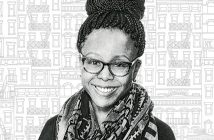Once Sahar Moazami identifies an interest, she pursues it with the passion of a true advocate.
Days before Sahar Moazami started orientation at Fordham Law School, a 3L friend at the Law School challenged her to pursue her passions in her first year rather than focus exclusively on reading casebook after casebook in her required classes. Moazami, now a 3L, heeded the advice, attending student fairs and meetings during her first semester. In the ensuing years she has led student groups and spearheaded initiatives that assist marginalized and underrepresented individuals in the New York community and beyond.
During her 2L year, Moazami served as president of two student-led groups: Advocates for Sexual Health and Rights (ASHR) and the Fordham chapter of the National Lawyers Guild. She also was treasurer for Fordham OUTLaws, the School’s LGBTI law students association. Additionally, she sits on the Stein Scholars Council and serves as a steering committee member for the Coalition of Concerned Students, a group that strives to make Fordham Law School more racially diverse and more responsive to incidents of racial injustice.
Friends of Moazami describe her as “a mover and a shaker,” a coalition builder who thrives in leadership roles and who is always willing to fearlessly address issues related to diversity, race, and inclusion.
“I’m not taking on anything I don’t have my full heart in,” Moazami says. “Once your heart is in something, you make the effort.”
Before enrolling at Fordham Law, Moazami graduated with a political science degree from Boston University, then spent a year volunteering for FEMA Corps, where she assisted in disaster aid in places such as New Jersey, following Hurricane Sandy.
Moazami entered Fordham Law School with a desire to work on domestic issues related to the LGBTI community, including HIV/AIDS programs and policies. By her first week, she had joined ASHR, which, in recent years, has examined sex workers’ rights (specifically how they intersect with the transgender community) and has partnered with the Resilience Advocacy Project to send law students into high schools to educate youth on pregnancy and reproductive rights.
ASHR and similar student groups meet regularly with administrators from the School’s Public Interest Resource Center (PIRC), which provides counsel and support to help the groups achieve their service-oriented missions. At these monthly meetings, Sahar’s hand is frequently the first to rise when volunteers are requested, PIRC staff says.
“Sahar doesn’t shy away from the limelight,” says Tom Schoenherr, PIRC’s assistant dean, describing Moazami as a “model public service student.”
“She’s always ready to stand up and use her voice and her mind to fight for something better,” says Leah Horowitz, who directs student organizations and publicity for PIRC. “She’s committed, dedicated, and passionate, and doesn’t say no when the opportunity to do something powerful arises. She somehow finds a way to do it.”
Moazami’s time at Fordham has enhanced her desire to work on global issues, particularly LGBTI and women’s rights issues in her parents’ native country of Iran. Moazami herself first visited Iran at age 13, observing that, while the palaces and other architectural wonders described to her by her parents still stood, other aspects of the nation no longer existed.
“As an Iranian, I developed a deep connection with other Iranians due to our cultural heritage, but I also rapidly came to understand that by identifying as a lesbian I would quickly be rejected from this very culture,” she says, noting at first she felt hopeless when confronted with the country’s stark oppression of its LGBTI community. “I decided to focus my career on changing this injustice so that one day I could go back to Iran and have the ability to display my identity as a proud Iranian as well as a lesbian.”
As a 2L Crowley Scholar with the Leitner Center for International Justice, Moazami worked on a training model that would make it possible for Iranian lawyers to learn about human rights treaties from center leaders.
“Participating in that training, where we looked at the specific human rights violations, was unsettling, but it pushed me to keep doing the work because I know the potential of the country,” says Moazami, who still has relatives living in Iran.
Last spring, Moazami participated in the Legislative and Policy Advocacy Clinic, where she worked on issues affecting children of incarcerated parents. She learned how the prison system impacts entire families, how to use information to frame an issue so that it appeals to the largest possible population, and the importance of learning as much as possible about all stakeholders involved, particularly legislators. Professor Elizabeth Cooper, who directs the clinic, was impressed with Moazami’s drive.
“Sahar has two essential skills for being a talented lawyer and a social change agent,” Cooper says. “She has a terrific capacity to listen carefully and deeply to the issues and priorities of others, and she has an amazing ability to build bridges among people of varied backgrounds to achieve common goals. It’s that capacity to listen and to build partnerships that really makes her stand out.”
Even as Moazami nears graduation, she uses her position as a 3L Stein Council member to provide reassurance to younger students struggling with doubts over exams. She notes that she once experienced this fear, so she regards assisting her fellow students as an obligation consonant with Fordham Law’s “In the service of others” motto.
“To make it so that mission works effectively on the outside, you have to create a strong basis on the inside,” Moazami says.




